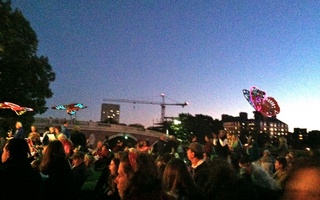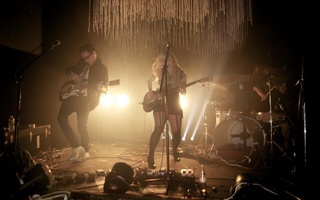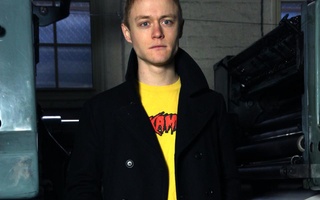If there has ever been a band that has traversed all genres of music, it is Café Tacvba. (The ‘v’, pronounced like a ‘u’, is in place to avoid copyright issues with the café the band named itself after.) For over two decades the band has experimented with electronica, punk, ska, hip-hop, rock, and even regional Mexican styles like bolero and ranchera. The wide variety of experience they’ve acquired by testing all out of these styles has led to both hits and misses, and for now they’ve landed on a psychedelic and warped electronic-rock sound. On the strong but sometimes uneven “El Objeto Antes Llamado Disco,” Café Tacvba conveys their trippy, folkloric rock sound through powerful vocals, distorted electronic sounds, and precisely pitched guitar that all exemplify the band’s multi-faceted personality.
A very distinct and critical part of the band’s sound is Rubén Isaac Albarrán Ortega’s impressive vocal range. Ortega manages to hit rugged low sounds, smoother higher notes, and everything in between. On “Zopilotes,” his voice is especially powerful on strong, high notes held over long periods of time. When he sings, “They followed him with fear / With so much fear,” his voice moves up and down gracefully and passionately. Ortega’s voice takes on a new edge in “Volcán” as it is warped to create a trippy, psychedelic feel. Although at points Ortega is muffled by heavy electronic synthesizer sounds or by a rough and funky bass line, he largely overcomes these deficiencies.
On “El Objeto Antes Llamado Disco,” Café Tacvba maintains their quintessential blend of electronica and rock and are generally successful. Many of the songs begin with heavy, solid beats common in house music and electronic genres. But sharp guitar riffs then join these beats in Café Tacvba style, and the electronica and rock influences mesh to create a bold, full sound. However, this array of synthesizers, sonics effects, drums, and melodies is at times overwhelming, and what should be a powerful wall of sound turns into a loud buzzing that is far too busy to make any sense of, like in parts of “Andamios” and “De Este Lado del Camino.”
Some of the album’s most interesting songs find a unique balance between electronic and folkloric music. On “Espuma,” maracas and bongos are combined with a heavy guitar and a reverbing production to create a folkloric, tropical atmosphere with a rock tinge, demonstrating the band’s willingness to expand to different genres. The only thing that seems out of place in the song is the deep, belching bass that sounds like a mixture of a much less intense version of what is normally heard in dubstep and a typical funk bass line. However, it is better to see Café Tacvba experimenting than keeping within the constraints of a single genre.
Café Tacvba is less successful when attempting a psychedelic, ambient, light rock sound. In songs like “Pájaro,” there aren’t many build-ups, drops, or distinct developments. It’s a bit disappointing to have this lack of ups and downs, especially since the electronic sound that the band draws from depends on these dynamic changes. Most listeners would expect to hear some sort of climax, but “Pájaro” just maintains a steady rhythm and leaves much to be desired.
However, the band manages to surpass their few misses with many songs that are strong enough to be hits. “Aprovéchate,” for example, has a strong and catchy rhythmic guitar that matches up well with Ortega’s strong vocals. On this song and the whole album, Café Tacvba proves that they know the electronica genre well and that they have the musical talent and knowledge to combine it with rock and, on top of it all, to pay tribute to their Mexican roots.
Read more in Arts
Profile: Harvard Digital Art ClubRecommended Articles
-
 Now I Walk in Beauty: A Poem from Revels RiverSing
Now I Walk in Beauty: A Poem from Revels RiverSing -
HBS Rock Center Appoints New DirectorMeredith McPherron ’89 was born to be an entrepreneur--both of her parents started their own companies. Now she is trying to bring that the entrepreneurial spirit she is so familiar with to the Harvard Business School.
-
 Beat of the Bay: The Vandelles
Beat of the Bay: The Vandelles -
 Mark R. Parker
Mark R. Parker -
 R.I.P., '30 Rock'
R.I.P., '30 Rock' -
“G.I. Joe” A No-Go"G.I. Joe: Retaliation" is the sequel to the 2009 film "G.I. Joe: Rise of Cobra" and picks up where it left off. The film stars Dwayne "The Rock" Johnson and includes the star of the previous film, Channing Tatum. "Retaliation" struggles because it never decides whether it is a comedy or a serious action movie.













